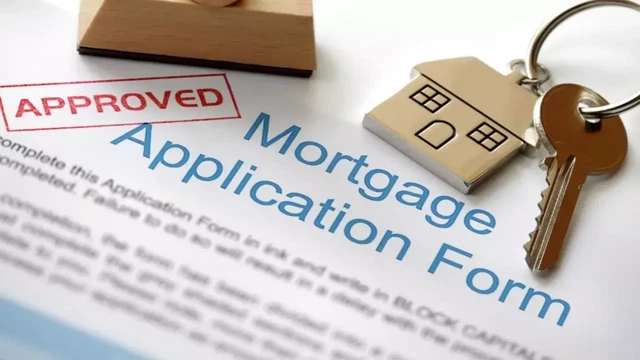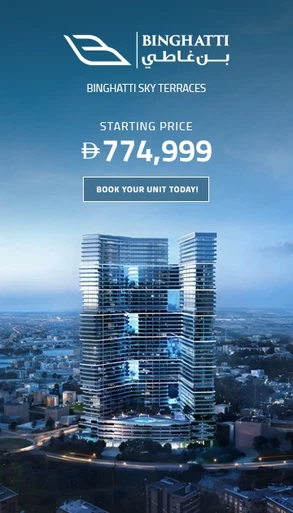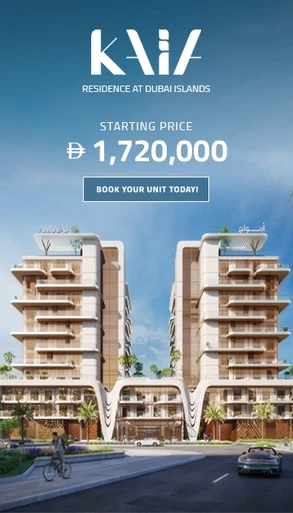Dubai's seamless success in tourism, commerce, and world-class living has positioned the city as a global economic hub. While many expats and investors dream of buying a property in the vibrant city of Dubai, Dubai offers numerous opportunities for all of them to turn their dreams into reality.
There are two ways to buy a property in Dubai- with cash or on a mortgage. However, investing or buying a property with cash is a cost-effective method. Still, the flexibility of buying a property on a mortgage involves many finance management strategies.
Navigating the intricacies of mortgages is crucial to finding your dream home instantly. This blog post answers all your queries regarding Dubai property mortgages and other issues relevant to getting a mortgage in Dubai. The guide incorporates each detail to help you understand the Dubai property market clearly.

Understanding Getting a Mortgage in Dubai
Mortgage Meaning
A mortgage is a lease obtained for real estate property. However, the borrower reimburses the loan via an agreed-upon set of payments. In Dubai, mortgages are accessible to both expats and residents.
However, the terms and conditions can slightly differ depending on factors like financial stability, employment conditions, and residency status.
Types of Mortgages in Dubai
Before proceeding to pursue a mortgage, borrowers are required to consider the significance of different types of mortgages in Dubai. A few standard mortgage types, discussed below, are available in the UAE.
1. Fixed-Rate Mortgage
It is the most common mortgage type, and the interest rate is fixed throughout the loan duration. The borrower is offered a specified rate to be reimbursed within a specified time, often between 1 and 5 years.
The key benefit of securing a fixed-rate mortgage is the constant interest rate, which will help predict the payment irrespective of market fluctuations.
2. Variable-Rate Mortgage
Variable-rate mortgages or adjustable-rate mortgages (ARMs) work oppositely to fixed-rate mortgages. The interest rate in variable-rate mortgages alters periodically based on the fluctuating market, implying that the performance of a particular index or benchmark directly impacts the interest rate.
Although the standard variable rate is not as high as the fixed rate, the payments can amplify in case of a rise in interest rates.
3. Islamic Mortgage
Islamic mortgages are designed in compliance with Shariah Law. Such mortgages are not based on any kind of interest received or paid but instead follow a profit-sharing scheme.
The profit-sharing schemes include Murabaha (cost-plus financing) and Ijara (lease to own). Be considerate of the fact that Islamic mortgages are not available to everyone but only Muslims so that they can acquire a loan while not violating their religious beliefs.
4. Interest Rate Type
This is by far the most common type of mortgage loan in Dubai, and differs according to the nature of the interest rate agreed upon in the contract. UAE mortgage law provides the types of interest rates (under which the fixed interest rates mortgage and variable interest rates mortgage fall).
5. Short-Term Mortgage
All fixed-rate mortgages have a time period. In Dubai, mortgages run up to 25 years for non-commercial RE but only period of your fixed rate is 1–5 years. That means locking your fixed rate at the low end of that range (1-3 years) would be short-term.
You can now get 3.89% for three years. Interest rates for shorter fixed periods come with more favourable conditions, as a general rule of thumb.
6. Long-Term Mortgage
Anything approaching the five-year mark would be a long-term fixed period for Dubai’s market. Investors can get a 5-year fixed rate of 3.99%, slightly above the short-end rate.
Principal Actors to Serve the Dubai Mortgage Industry
Various financial institutions and banks provide property mortgages in Dubai. It is essential to note that each of these mortgage lending companies contains its own set of products, application procedures, and eligibility criteria. These institutions include;
- First Abu Dhabi Bank (FAB)
- Abu Dhabi Commercial Bank (ADCB)
- Standard Chartered
- Dubai Islamic Bank
- Mashreq Bank
- HSBC
- Emirates NBD
- RAKBANK
- National Bank of Fujairah
Eligibility Requirements for Getting a Mortgage in Dubai
To be eligible for a mortgage in Dubai in 2025, you typically need to be a UAE resident or national, aged between 21 and 65 years old, have a stable job with a verifiable income, a good credit history, and a sufficient down payment (usually between 20-30% of the property value), with specific requirements varying depending on the lender and your individual circumstances; non-residents may also be eligible under certain conditions.
a) Mortgage in Dubai For Residents
1. Employment and Source of Income
Most banks demand evidence of secure employment and a settled wage, usually around AED 15,000 for salaried workers and more for self-employed people.
2. Credit History
Having a good credit score is essential for getting a mortgage in Dubai. The bank will investigate your credit history to determine whether you can pay reimbursements on time.
3. Down Payment
Getting a mortgage in Dubai for residents will require them to pay at least 20-25% down payment for the property they intend to buy.
4. Age
The borrower's age should typically be between 21 to 65 at the time of final mortgage payback.
b) Mortgage in Dubai for Expats
1. Income Proof
Non-residents are required to submit evidence of a stable income and standard employment status. The minimum income for non-residents is comparatively higher than that for residents.
2. Credit History
Few banks may solicit the credit report from the borrower's home country. It, therefore, needs to pertain to stainless credit history.
3. Down Payment
Non-residents are ready to pay a higher deposit than UAE residents. The required deposit is around AED 25-35% of the property value.
4. Age
The borrower should be between 21 and 65 years old at the time of the last mortgage repayment.
c) Required Documents
The documentation requirements may differ from one bank to another, though, include basic documents such as;
- Emirates ID (for residents)
- Valid Visa and passport (for residents)
- Proof of Salary or Income Certificate
- Credit Report
- Bank statements from the last three to six months
- Documents of the property
- Proof of Address
Mortgage Application Process in Dubai

Step 1: Evaluate your Financial Condition
Assess your financial situation before applying for a mortgage. This will help you ensure that you have sufficient money for the down payment and other relevant expenses, a good income, and a decent credit history.
Step 2: Select an Appropriate Mortgage
Explore several mortgage options offered by banks in Dubai. The banks deal differently with property mortgages in Dubai, so comparing terms, conditions, and interest rates might be more helpful.
In addition, consulting the right mortgage broker will ease your work. Mortgage brokers are professionals in their field and can guide you to the best deals based on your financial performance and property aims.
Step 3: Acquire a Pre-Approval Letter
A Dubai mortgage pre-approval letter is another requisite for gaining a mortgage. The selected bank issues a pre-approval letter. It can help you strengthen your position as a serious buyer.
It involved an initial evaluation of your financial health and credit reliability. Lastly, a pre-approval letter estimates how much you can borrow.
Step 4: Find your Property
Once you have attained a pre-approval letter, you can finally begin to look for your dream home. Undertaking the budget and other factors is crucial while confidently finding a property.
Factors such as property type, location, and future resale value are highly considerable. The pre-approval letter remains valid for 60 to 90 days, ultimately providing enough time to get your hands on your desired property.
Step 5: Submit Mortgage Application
After selecting a property, it is essential to submit a formal application to the relevant bank. Attach all the required documents at the first attempt to accelerate the process.
Step 6: Property Valuation and Legal Checks
Your selected bank will carry out a property evaluation and legal checks to determine the legality and worthiness of the property. This step can take a few days and may take longer than a few weeks.
Step 7: Final Approval and Mortgage Offer
After the selected bank completes each detailed verification, it will extend you a mortgage offer. The offer entails details regarding terms and conditions such as repayment schedule, interest rate, and the amount of the loan provided.
You are required to go through the document carefully and thoroughly before accepting and finalizing the offer.
Step 8: Sign the Mortgage Contract
The mortgage contract will require signatures after the offer is accepted. Be certain that you accept the mortgage offer, which includes all terms and conditions, retribution for delayed payments, and early payment terms.
Step 9: Mortgage Registration and Transfer of Ownership
Voila! You are just left with the final step of transferring the property in your name and registering the mortgage with the Dubai Land Department (DLD). Dubai Land Department will then release a title deed stating the bank's interest in the property and your ownership.
Costs Associated with Mortgages in Dubai
Securing a mortgage in Dubai comes with additional costs besides downpayment and monthly reimbursements. The estimated additional expenses include;
1. Valuation Fees
The bank values the property and charges a specified amount of money for that, which costs around AED 2,500 to AED 3,500.
2. Processing Fee
The selected bank also charges a processing fee for managing your mortgage application. The fee typically varies between 0.25% and 1% of the loan amount.
3. Insurance
Getting property and life insurance is mandatory in Dubai. The cost of covering insurance differs based on the property value and loan amount.
4. DLD Fees
The Dubai Land Department expects a fee for registering the property. The fee usually costs around 4% of the property value.
5. Real Estate Agent Fee
If you have hired a real estate agent or broker, they expect a commission. The estimated cost of commission is around 2% of the property value.
6. Early Settlement Fee
In case of the early reimbursement of your mortgage, you might induce an early settlement fee, usually 1% to 3% of the remaining loan amount.

Tips for Getting a Mortgage in Dubai
1. Enhance your Credit History
A decent credit history can significantly improve your chances of securing a mortgage on favorable terms. If you are willing to apply for a property mortgage in Dubai, start clearing your bills timely, shrink additional debts, and request miscellaneous loans and credit cards in a short time.
2. Save for a Maximum Down Payment
Saving for a maximum down payment can significantly reduce your mortgage loan amount, reduce your monthly payments, and amplify the chances of better interest rates.
3. Hire a Mortgage Advisor
An expert mortgage broker will assist you in getting through the intricacies of mortgage dynamics. Moreover, professional mortgage brokers will discuss the terms and conditions on your behalf and offer helpful insights about your options.
4. Overview of the Agreement
Before finalizing your application with the selected bank, it is preferred that you read and understand the terms and conditions thoroughly to avoid any problems in the future.
5. Stay Informed
Be aware of the changes taking place in the Dubai real estate industry. The city's market remains quite dynamic and diverse and continuously evolves with time. Furthermore, the changes might be linked with mortgage regulations and interest rates; hence, staying informed will help you make beneficial and timely decisions.
Common Pitfalls to Avoid
1. Negligence to Market Situations
Dubai's dynamic real estate market fluctuates in property values. Therefore, it is better to carefully assess the market before deciding to avoid buying a property in an area with declining value or peak times.
2. Not Getting Pre-Approval Letter
Without a pre-approval letter from the bank, you might experience disappointment or delays. Securing a Pre-approval letter will offer you a definite financial framework, after which you can easily search for your desired property.
3. Overstretching Your Budget
Ensure that your mortgage payments do not exceed your monthly income. In addition, try to attain a sustainable and comfortable payback percentage to avoid any penalties. Bear in mind that financial strain can lead to missed payments.
4. Ignoring Associated Costs
Undertaking the potential cost associated with owning the property on mortgage loan payment will help you get through the property-buying process in Dubai. Neglecting additional costs like fees for property maintenance, insurance, and Registration can put a financial strain upon you.
Closing In
In conclusion, getting a property mortgage in Dubai is a genuine financial commitment, but navigating the process rightly makes it manageable and rewarding. In addition, the role of the Dubai Land Department is also significant, as it ensures transparency in the mortgage process.
It is essential to understand the types of mortgages available with Dubai Banks, the application process, and the eligibility criteria for making informed decisions. Whether you are a non-resident or resident, buying a property in Dubai is a valuable investment. However, if you are willing to buy the property with a mortgage amount, then be considerate of the supplementary costs that come along with it.
The increased demand for residential properties in Dubai has driven government initiatives. The government of Dubai has been working with new policies to introduce for the betterment of expats, residents, and businesses. By staying aware of the current market trends and following the steps outlined in this article, you can confidently navigate the mortgage process in Dubai.
Explore More...






